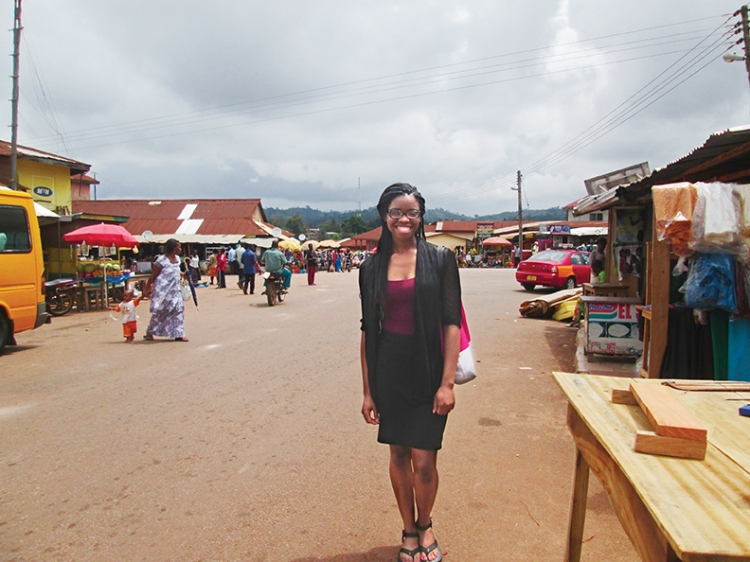
By
Connell School of Nursing junior S. Chiamaka Okorie emigrated from Nigeria to America when she was eight, but since she started her nursing studies the thought of returning to Africa had been on her mind.
Over the summer, she fulfilled that wish and, for good measure, also was able to put her talents to work on a pressing public health problem in Africa.
Okorie traveled to Ghana on an Amanda V. Houston Traveling Fellowship to conduct a research project on malaria prevention as a volunteer with the Ghana Health and Education Initiative (GHEI), a non-governmental organization. As a GHEI field coordinator, Okorie worked with other volunteers and local community health workers on comprehensive surveys that gauged the success of past malaria interventions and identified opportunities for new interventions.
The survey asked detailed questions about malaria, family planning, pre-natal and post-natal care, said Okorie. As field coordinator, she was responsible for keeping track of how many surveys were submitted, completed or in need of revision.
Okorie’s volunteer work informed her independent research project, “Perceived Susceptibility to Malaria: An Evaluation of Bed Net Usage of Ghanaian Mothers and Children under Five.” Okorie is a scholar in the Connell School’s KILN (Keys to Inclusive Leadership in Nursing) program, an initiative that assists students in maximizing their leadership potential, prepares them for the challenges of providing nursing care in an increasingly multicultural society and nurtures their ability to create positive social change.
“GHEI provided me with experience in epidemiology and taught me what it meant to do public health and organize a non-governmental organization in a low-resource setting,” said Okorie, who plans to pursue a career in public health.
“I am still working on the data we collected, but I am hoping to show a correlation between strong pre-natal and post-natal care and the usage of bed nets in mothers and children under five years old, the two most high-risk populations.
“The complexities of public health became even clearer to me,” she continued. “As I have learned in nursing, each intervention must be carefully and individually woven. I intended to only focus on mothers, babies and malaria, but saw the way other factors, like education, financial situation and distance from a healthcare facility shaped each case. It was a humbling opportunity to assess data quantitatively and see, in front of me, the qualitative picture.”
While in Ghana, Okorie had the opportunity to tour the Bibiani Government Hospital and meet the doctors and nurses.
In her spare time, she was able to visit the local markets and farms, take in some music and cooking lessons and tour Kakum National Park.
“My favorite moment in Ghana was visiting Cape Coast Castle, where slaves were held before their departure. Learning more about this aspect of Ghanaian history and the conditions of the slaves was heart-wrenching but inspirational. It made me realize the future I hope to have is very much rooted in a history and struggle that is greater than me.
“I am very grateful to African and African Diaspora Studies Department for the Amanda V. Houston Traveling Fellowship, which supported this enriching opportunity to work with GHEI and research. I am especially thankful for my research advisor, [O’Neill Library Instructional Services Manager] Kwasi Sarkodie-Mensah, and mentors across the Connell School of Nursing for encouraging and guiding me.”



